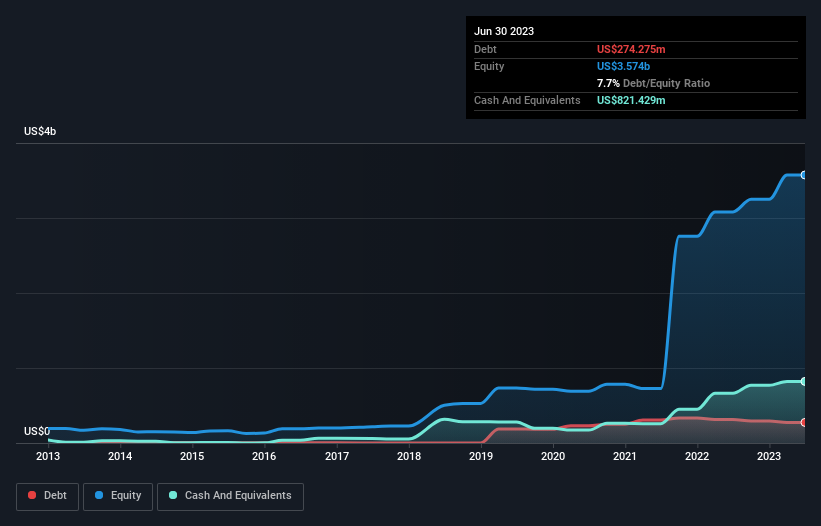
Warren Buffett famously said, 'Volatility is far from synonymous with risk.' It's only natural to consider a company's balance sheet when you examine how risky it is, since debt is often involved when a business collapses. We note that Allkem Limited (ASX:AKE) does have debt on its balance sheet. But the real question is whether this debt is making the company risky.
Why Does Debt Bring Risk?
Debt assists a business until the business has trouble paying it off, either with new capital or with free cash flow. Part and parcel of capitalism is the process of 'creative destruction' where failed businesses are mercilessly liquidated by their bankers. However, a more common (but still painful) scenario is that it has to raise new equity capital at a low price, thus permanently diluting shareholders. Having said that, the most common situation is where a company manages its debt reasonably well - and to its own advantage. The first step when considering a company's debt levels is to consider its cash and debt together.
See our latest analysis for Allkem
How Much Debt Does Allkem Carry?
The image below, which you can click on for greater detail, shows that Allkem had debt of US$274.3m at the end of June 2023, a reduction from US$313.1m over a year. However, its balance sheet shows it holds US$821.4m in cash, so it actually has US$547.2m net cash.

How Healthy Is Allkem's Balance Sheet?
According to the last reported balance sheet, Allkem had liabilities of US$445.8m due within 12 months, and liabilities of US$1.20b due beyond 12 months. Offsetting these obligations, it had cash of US$821.4m as well as receivables valued at US$142.9m due within 12 months. So its liabilities outweigh the sum of its cash and (near-term) receivables by US$679.1m.
Given Allkem has a market capitalization of US$3.67b, it's hard to believe these liabilities pose much threat. But there are sufficient liabilities that we would certainly recommend shareholders continue to monitor the balance sheet, going forward. Despite its noteworthy liabilities, Allkem boasts net cash, so it's fair to say it does not have a heavy debt load!
On top of that, Allkem grew its EBIT by 86% over the last twelve months, and that growth will make it easier to handle its debt. The balance sheet is clearly the area to focus on when you are analysing debt. But ultimately the future profitability of the business will decide if Allkem can strengthen its balance sheet over time. So if you're focused on the future you can check out this free report showing analyst profit forecasts.
But our final consideration is also important, because a company cannot pay debt with paper profits; it needs cold hard cash. Allkem may have net cash on the balance sheet, but it is still interesting to look at how well the business converts its earnings before interest and tax (EBIT) to free cash flow, because that will influence both its need for, and its capacity to manage debt. In the last three years, Allkem's free cash flow amounted to 26% of its EBIT, less than we'd expect. That's not great, when it comes to paying down debt.
Summing Up
Although Allkem's balance sheet isn't particularly strong, due to the total liabilities, it is clearly positive to see that it has net cash of US$547.2m. And we liked the look of last year's 86% year-on-year EBIT growth. So we don't have any problem with Allkem's use of debt. We'd be motivated to research the stock further if we found out that Allkem insiders have bought shares recently. If you would too, then you're in luck, since today we're sharing our list of reported insider transactions for free.
At the end of the day, it's often better to focus on companies that are free from net debt. You can access our special list of such companies (all with a track record of profit growth). It's free.
New: Manage All Your Stock Portfolios in One Place
We've created the ultimate portfolio companion for stock investors, and it's free.
• Connect an unlimited number of Portfolios and see your total in one currency
• Be alerted to new Warning Signs or Risks via email or mobile
• Track the Fair Value of your stocks
Have feedback on this article? Concerned about the content? Get in touch with us directly. Alternatively, email editorial-team (at) simplywallst.com.
This article by Simply Wall St is general in nature. We provide commentary based on historical data and analyst forecasts only using an unbiased methodology and our articles are not intended to be financial advice. It does not constitute a recommendation to buy or sell any stock, and does not take account of your objectives, or your financial situation. We aim to bring you long-term focused analysis driven by fundamental data. Note that our analysis may not factor in the latest price-sensitive company announcements or qualitative material. Simply Wall St has no position in any stocks mentioned.
About ASX:AKE
Allkem
Allkem Limited engages in the production and sale of lithium and boron in Argentina.
Undervalued with adequate balance sheet.
Similar Companies
Market Insights
Community Narratives





